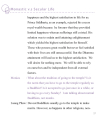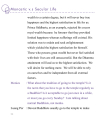self-satisfaction : ค้นหาหนังสือธรรมะ
หน้าหนังสือทั้งหมด

25
Monastic vs Secular Life: Finding True Happiness
Monastic v.s Secular Life
Monica
happiness and the highest satisfaction in life for us.
Prince Siddharta, as an example, rejected his excess
royal wealth because he foresaw that they provided
limited
This text discusses the journey towards true happiness and satisfaction in life, contrasting monastic life represented by Prince Siddharta, who renounced royal wealth for enlightenment, with secular l

38
Chapter 4: Cultivating Good Emotions through Meditation
The extracted text from the image is:
-----------
Chapter 4
Those who meditate with consistency will have good emotions, and can easily see and understand the truth that everyone has good and bad in
Chapter 4 emphasizes the significance of regular meditation in helping individuals recognize the duality of good and bad within themselves and others. By understanding this balance, people can cultiva

14
Building a Trustworthy Family
involvement with this distrustful person. Good people will not
want to befriend dishonest people because they do not want to
gain a bad reputation through association.
So if a person in a family does
The text emphasizes that honesty and self-control are essential for a trustworthy family environment. Good people avoid associations with dishonesty. A family lacking truthfulness cultivates suspicion

14
Building Strong Family Foundations Through Truthfulness and Self-Control
involvement with this distrustful person. Good people will not want to befriend dishonest people because they do not want to gain a bad reputation through association.
So if a person in a family does
This text discusses the importance of truthfulness (sacca) and self-control (dama) in family dynamics and personal growth. It emphasizes that individuals with a lack of truthfulness can create distrus

62
Understanding Buddhist Concepts: Key Terms and Definitions
phenomena; outside the sphere of natural law; supernatural (unexplainable phenomena)
อดิษฐาน past life; previous life; previous existence
อทินนนทาน taking what is not given; stealing
อทุกขมสุข neither
This text presents key Buddhist concepts such as 'อนัตตา' (non-self), emphasizing that there is no lasting essence, only the illusion of self that causes attachment. It discusses 'อนิจจตา' (impermanen

26
Monastic vs. Secular Life
Monastic v.s Secular Life
Monica
Luang Por
26
wealth to a certain degree, but it will never buy true
happiness and the highest satisfaction in life for us.
Prince Siddharta, as an example, rejected hi
เนื้อหาเกี่ยวกับการเปรียบเทียบระหว่างชีวิตทางศาสนากับชีวิตทางโลก โดยเฉพาะอย่างยิ่งในมุมมองของพระโสดาบันและความคิดของเจ้าชายสิทธัตถะซึ่งละทิ้งความมั่งคั่งเพื่อค้นหาความสุขที่แท้จริงจากการปฏิบัติธรรม กา

12
What do Humans Really Want?
Chapter 3
What do Humans Really Want?
F
or most people, the list of things they want can
probably go on forever; in contrast, the list of
things they need is probably quite short. We have
a hard time
In this chapter, we explore the overarching nature of human desires, noting how the list of wants is almost limitless compared to the shorter list of needs. While necessities like shelter are essentia

126
The Stages of Good Deeds
…s: Once we have done
something good, no matter if anybody sees it or not, the first
thing we get is self-satisfaction.
"The second stage of good deeds: When we keep doing
good deeds, the second thing we get is the dev…
The text outlines the four stages of good deeds: self-satisfaction, development of character, recognition of hard work, and societal esteem. It emphasizes patience in…

126
Truth for the Family: The Impact of Good Deeds
… of good deeds: When we have done
something good, even if no one sees it, the first thing
we get is self-satisfaction.
2. The second stage of good deeds: When we keep
doing good deeds, the second thing we get is the
d…
…usses the importance of good deeds within a familial context. It details four stages of good deeds: self-satisfaction from the initial act, the development of a virtuous personality through consistent actions, the eve…

126
The Stages of Good Deeds and Their Rewards
…s: Once we have done something good, no matter if anybody sees it or not, the first thing we get is self-satisfaction.
"The second stage of good deeds: When we keep doing good deeds, the second thing we get is the dev…
…ogy between the stages of good deeds and the growth of banana plants, highlighting four key stages: self-satisfaction, development of character, realization of fortune, and societal esteem. It emphasizes the need for …

95
Understanding Merit and Its Impact on Life
someone who is angry or hateful. When we are happy and content with ourselves, we project a personality of self-confidence and social grace. For this reason, merit can indeed change our personality to
Merit is an integral part of our personality, bringing satisfaction and contentment while enhancing social grace and self-confidence. It cannot be transferred, as it belongs solely to the individual.

118
Truth for the Family: Dhamma Teachings
Part Five: Truth for the Family
about Dhamma and learned that there was a set of teachings
specifically tailored for householders. They include four
main virtues, which are:
1. Truthfulness (sacca): T
Part Five discusses essential virtues for householders taught in Dhamma, emphasizing truthfulness, self-improvement, and enduring hardships. Truthfulness (sacca) encourages honesty and accountability,

15
Self-Training and Endurance in Family Life
Those who have full knowledge, ability and goodness
must follow only this path in order to train themselves to keep
up with the world and its people, and not surrender to
defilements.
Surely, if you f
This text emphasizes the significance of self-training and self-control in leading a fulfilling life. By acknowledging the need to change negative habits, individuals can foster a healthier family env

25
The Four Problems in Marriage
Part One: Family Life
These are: Truthfulness (Sacca), Self-Control (Dama),
Endurance (Khanti), and Sacrifice (Caga). When lacking in
any of these principles, conflict or discord will arise in any
hum
Part One: Family Life highlights four essential principles for maintaining healthy relationships: Truthfulness (Sacca), Self-Control (Dama), Endurance (Khanti), and Sacrifice (Caga). Conflict within f

184
Glossary of Key Concepts in Buddhist Philosophy
Part Seven: Appendixes
Glossary
Anattata: Non-self; nothing in the world has implicit
identity
"There is nothing out there, not even our bodies, which
we can control. Thus, it is not distinctly ours.
This glossary provides definitions for key Buddhist concepts such as Anattata (non-self), Aniccata (impermanence), and Bhavana (meditation). It emphasizes the understanding that nothing possesses a pe

142
Self-Responsibility and Social Development in Buddhism
Suzanne Jeffrey
And that’s where we close the circle. We do it for ourselves because we have to develop ourselves before we can develop anything else … but everything about us affects all of the peop
The text discusses the necessity of self-development before aiding others, emphasizing self-responsibility post-birth. It highlights the crisis of independence and the importance of moral boundaries i

78
The Teachings of the Buddha
The Teachings of the Buddha
The Teachings of the Buddha are known as Dhamma, a Pali word for the Truth, the law of righteousness. In his first sermon the Buddha emphasized that one should live the Mi
The Teachings of the Buddha, known as Dhamma, emphasize the Middle Way, avoiding extremes of indulgence and self-mortification. Central to Buddha's teachings are the Four Noble Truths, which acknowled

136
Journey to Joy
Journey to Joy
136
find the
help you
way to reach your biggest goal in
life. You will get satisfaction and joy. Everything
you are looking for - you will find not outside, but
inside yourself. No one
In 'Journey to Joy', the author emphasizes the importance of looking within oneself to achieve life goals. Through the practice of meditation, individuals can uncover their inner light, leading to sat

66
Maintaining Joy in the Workplace
MAINTAINING MEDITATION IN EVERYDAY LIFE
52.The Joyous Mind at Work
Maintain joy in your mind
the whole of the time
irrespective of the circumstances.
Be careful not to let
negativity bruise your mind
This text emphasizes the importance of maintaining a joyous mindset while working, regardless of the challenges or unfair situations that may arise. It advises against letting negativity affect your m

45
The Importance of Moral Education in Teaching
…e tasked with the training of teachers. Teachers must be fully aware that they are teachers not for self-satisfaction or benefit but have, chosen to take responsibility for the future of not only their immediate pupil…
This text emphasizes the necessity of moral education to eliminate selfish and greedy tendencies, enabling peaceful coexistence. It discusses the role of various types of teachers—parents, school teac
